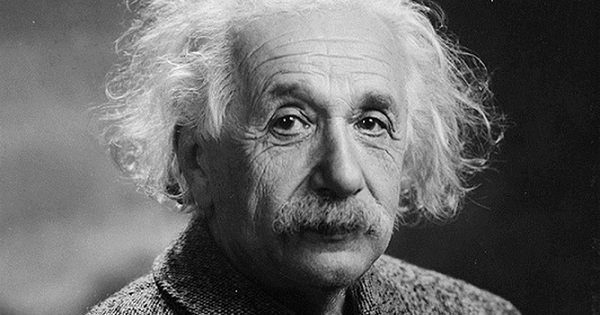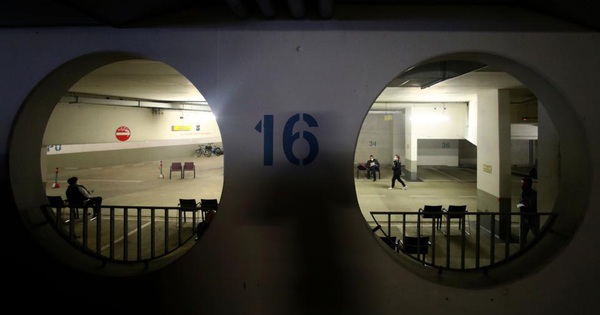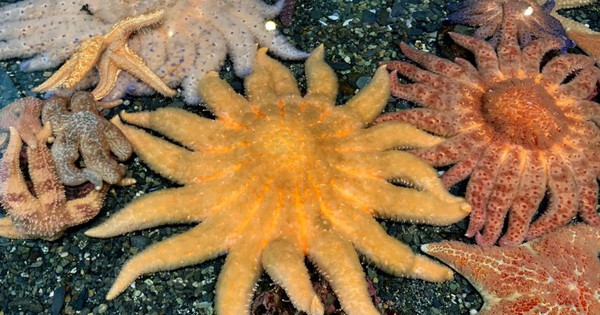According to Euronews (France), the European Union (EU) is facing an extremely rare dilemma: How to cut its heavy and costly dependence on Russian energy while maintaining keep the light on for people and businesses across the continent.
Last year, the bloc spent nearly 100 billion euros on Russian energy imports.
Faced with the current situation, the European Commission (EC) has announced an ambitious plan – REPower EU (Re-Energy to the EU – to achieve complete energy independence from Russia from 2027.
EU Energy Commissioner Kadri Simson said: “Unlocking Europe from the bloc’s largest energy supplier will be difficult. However, the economic benefits of ending dependence will far outweigh the short-term costs of the REPowerEU plan.”.
For a customer who has for decades been accustomed to cheap and reliable supplies from Russia, stopping imports altogether will entail enormous challenges such as: Diversifying suppliers, redesigning infrastructure, minimizing price increases, promoting renewable alternatives and, above all, ensuring that households and factories remain uninterruptedly supplied with electricity.
“[Tình hình xung đột] is disrupting the global energy market“, said Ms. Ursula von der Leyen, President of the EC, when presenting the plan on the afternoon of May 18.”It shows how dependent we are on imported fossil fuels and how vulnerable we are to depending on fossil fuel supplies from Russia.“.
All eyes are on LNG
Russia is the EU’s main gas supplier, accounting for 45% of total gas supplies – 155 billion cubic meters (bcm) – in 2021.
Brussels is well aware that this huge amount of gas will not disappear overnight or be replaced by green energies, so the first priority is to find other sources of supply to fill the gap caused by the import halt. from Russia.
Liquefied natural gas (LNG) emerged as the most readily available solution to this predicament. LNG is gas that has been cooled and transported by ship, then loaded and unloaded with complex terminals that turn the liquid back into a gas.
This gives a big advantage to coastal countries with terminals, such as Spain, Italy and the Netherlands, and can increase purchases with relative ease. The EU has broken its LNG import record since early 2022, reaching 12.4 bcm in April.
However, LNG is very expensive and the global market is very competitive, especially when Asian buyers have already spent large sums of money before. It also puts landlocked nations at a disadvantage because they cannot access ports and are forced to receive gas supplies through pipelines, most of which are operated by Russia.
Under the EU REPower plan, up to two-thirds of Russia’s gas – about 100 bcm – could be cut by the end of the year. Half of this – 50 bcm – will be replaced by LNG, while 10 bcm will come from non-Russian pipelines, including those from Norway, Azerbaijan and Algeria.
The EU is currently focused on concluding agreements and partnerships with leading LNG producers. Based on a recently concluded agreement, the US will supply the bloc with an additional 15 bcm of LNG.
Brussels also works with Qatar, Egypt, Israel and Australia to secure additional supplies and wants to explore the potential of African countries like Nigeria, Senegal and Angola.
However, the push to replace Russian gas with too much LNG has been criticized by environmental groups, who say LNG will prolong the bloc’s reliance on polluting fuels and make it difficult to difficult to achieve climate goals.
Greenpeace EU energy campaigner Silvia Pastorelli said:These plans will continue to flow into the pockets of energy giants like Saudi Aramco and Shell, who are making record profits later. [xung đột]while people in Europe struggle to pay the bills”.
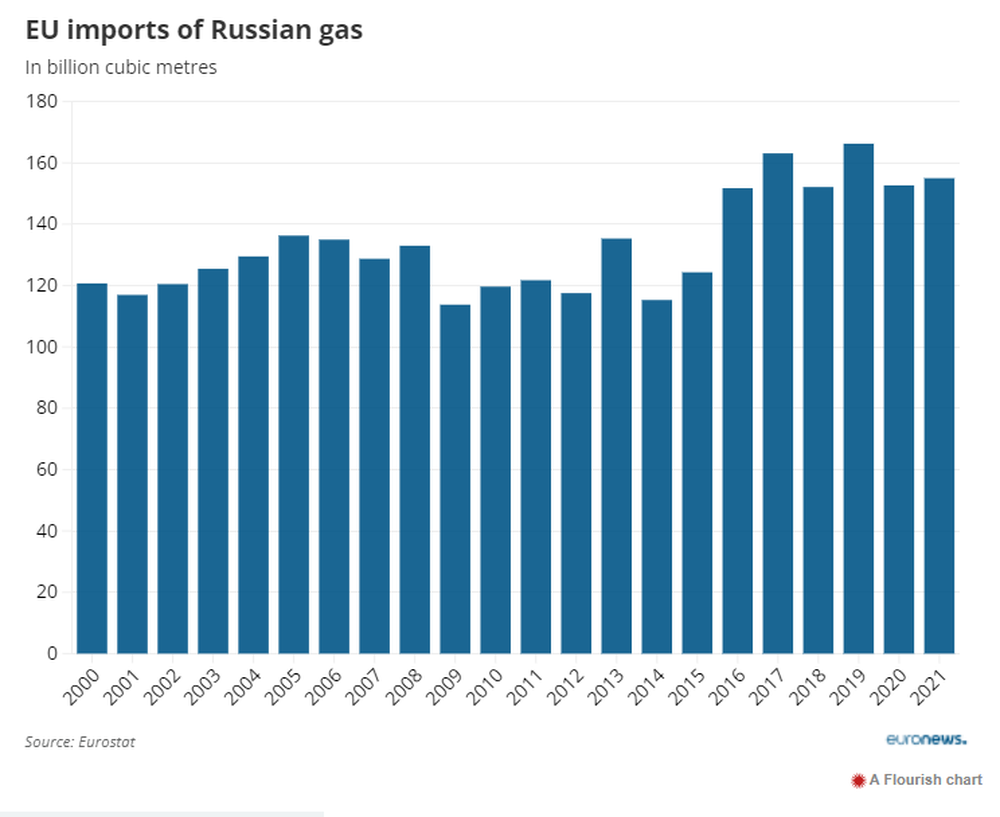
Statistics of EU’s Russian gas imports
27 in 1
To overcome fierce competition for LNG, Brussels wants the 27 member states to buy as a single customer and exploit their synergy as the world’s largest single market.
The bloc has set up the EU energy platform, a voluntary scheme to aggregate demand and coordinate imports, which first came into force in early April.
Brussels aims to go a step further and create a “joint purchase mechanism”, a collective joint venture to negotiate gas contracts on behalf of member states.
This mechanism will be voluntary and build on the lessons learned from the purchase of the COVID-19 vaccine, which the EC has directed to have millions of doses available at affordable prices.
The idea of a joint purchase of gas emerged last fall, when the electricity crisis began sending electricity bills skyrocketing. France, Spain, Italy, Greece and Romania have previously voiced support for the idea of a joint purchase, saying it would lower product prices and increase energy security.
“This is very important for all member states, starting with the major countries“, Simone Tagliapietra, a senior fellow at Bruegel, told Euronews.It is also beneficial for small countries, particularly in the East, that may have problems importing gas in the event of a disruption in Russian flows. It will protect overall energy security in Europe“.
Great difficulty
Since gas is a commodity in high demand but very limited, the EU needs to find other resources that can make up for Russia’s fuel loss.
REPower EU is seen as an additional layer of the European Green Agreement and has a distinct focus on renewable energy. The EC proposes to accelerate the deployment of solar and wind energy systems with the aim of replacing more than 20 bcm of Russian gas by the end of the year.
But this goal faces a big wall: On average, the construction of wind farms takes 9 years to complete while solar panels take 4 to 5 years to complete the system. The process is complex and requires many authorizations related to building, energy, environmental and architectural standards.
In a new recommendation, Brussels asks member states to accelerate progress and establish binding maximum deadlines for all relevant phases. Renewable energy has become a “major public good” pressuring the licensing process to go faster.
Alex Mason, head of energy policy at the WWF EU office, said speeding up licensing was a good idea but the procedures were cumbersome.
The EC proposes to raise the EU’s renewable target by 2030, from 40% to 45% of all energy produced across the bloc, and to mandate the use of solar panels in all public and commercial buildings. new in 2025 and in all residential units by 2029.
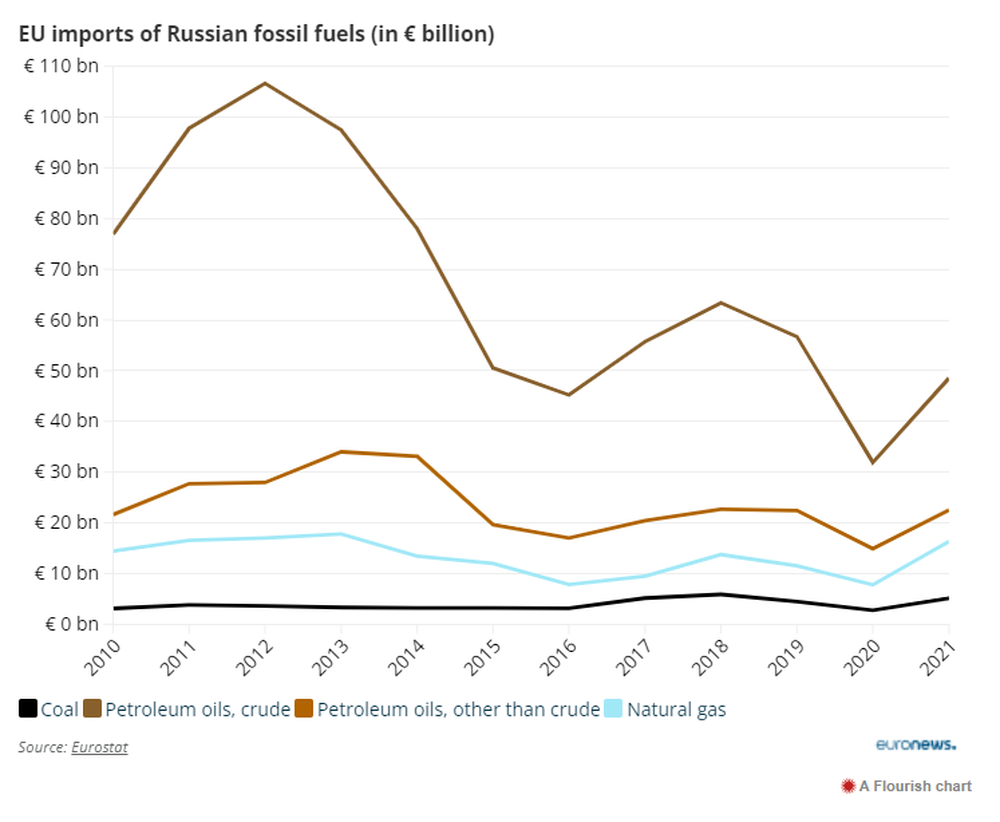
EU data table of fossil fuel imports from Russia
Question about ‘behavior change’
Breaking off dependence on Russia for energy will require the EU to invest more in LNG and solar panels, so the bloc’s big goal will also need to “change behavior” in the way Europeans consume electricity. Europe.
Among them are recommendations such as using more public transport, slowing down on highways, reducing heating and air conditioning systems, working from home and choosing energy-efficient home appliances.
“Saving energy is the cheapest, safest and cleanest way to reduce our dependence on fossil fuel imports from Russia“, the EC document reads.
According to Euronews, none of these proposals are legally binding and also echo previous calls by the International Energy Agency (IEA).
Brussels estimates that the adoption of these measures will reduce electricity demand and eliminate the need for 13 bcm of Russian gas in the short term.
But because the proposals lack legal weight, it is unclear whether European households and companies, who are dealing with sky-high bills and soaring inflation, will be willing to do so. how.
The EC intends to work with the IEA, national and local governments to develop information campaigns to promote energy efficient behaviour.
The price is too expensive
According to EC estimates, the EU will pay a heavy price: Russia’s energy independence will cost 210 billion euros in additional investment between 2022 and 2027.
More than 110 billion euros will go towards the deployment of renewable energy and hydrogen systems, while 10 billion euros will be used to diversify LNG supplies and gas pipeline systems. Brussels has suggested most of the money should come from the unused loans of the COVID-19 recovery fund.
When EU leaders agreed to step up the fund in 2020, they split the fund into 312.5 billion euros in grants and 360 billion euros in low-interest loans. Since the loans were repaid gradually, the majority of member states abandoned them and requested only their share of the allocated funding.
The fund has 225 billion euros left and can now be tapped to finance the redesign of energy networks. Revenue from the emissions trading system could bring in an additional €20 billion in funding.
“The combination of new aid with unused loans can turn out to be very attractive“, a senior EC official said, emphasizing that the economic challenges posed by conflict will certainly require more financing.
Notably, the EC’s cost estimate includes €2 billion to renovate oil infrastructure.
As part of the new sanctions package, member states are currently discussing a ban on Russian oil, but the proposal remains stuck as Hungary, Russia’s major European energy customer, require more diversified and prolonged economic support
Hungary opposes EU’s 6th package of sanctions against Russia
In a recent interview with Rai News 24 (Italy), EU Economic Commissioner Paolo Gentiloni said that the bloc’s sixth package of sanctions against Russia had not been approved.
“We approved 5 sanctions packages very quickly and reached consensus, but the 6th package was still delayed for foreseeable reasons. However, I am optimistic about the prospect of finding a compromise” said Mr. Gentiloni.
The EU official explained that the Hungarian government did not oppose the decision to impose an energy embargo on Russia, but emphasized its own difficulties in terms of geography and energy supply model.
According to TASS (Russia), Hungary has vowed to block any EU sanctions proposal including bans on Russian energy, calling it a “red line” with Hungary’s interests. The Central European country imports 85% of its natural gas and more than 60% of its oil from Russia.
Currently, the permanent representatives of EU countries have not been able to reach an agreement on the sixth package of sanctions against Russia, including a draft oil embargo. Previously, the European Commission (EC) planned to gradually reduce its dependence on Russian oil within six months after the sixth package of sanctions took effect. At the same time, the EC also proposed to allow Hungary and Slovakia to buy oil from Russia until the end of 2024.
at Blogtuan.info – Source: Soha.vn – Read the original article here

